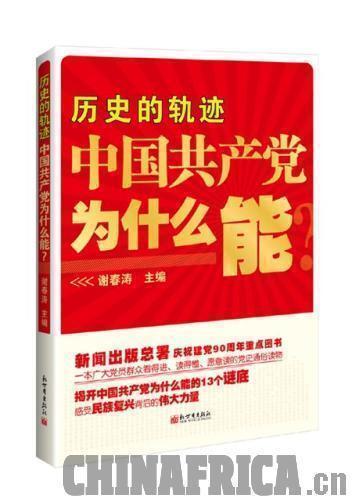|
 |
|
Why and How the CPC Works in China? |
The international community now views China and the Communist Party of China (CPC) with increasing respect because of a series of important and symbolic events – most notably the Beijing Olympic Games and the 2010 Shanghai World Exposition that attracted the world's attention, to the fast economic growth in China despite the global financial crisis. The year of 2010 marks the 90th anniversary of the founding of the CPC. A new development strategy will emerge with the coming 18th CPC National Congress in 2012. Analysts are now asking how the CPC has managed to be so successful as a party 90 years after it was founded and 60 years after it gained power?
This and other questions are answered in the book, Why and How the CPC Works in China, published in March 2011 by the Beijing-based New World Press. The book was collectively edited by experts and scholars from the Party School of the CPC Central Committee.
It answers 13 questions of the CPC's history. These questions include: Why was the CPC capable of establishing a new China? How did the CPC keep the people's support despite its mistakes? How did the CPC maintain power when the Eastern Bloc Communist Parties fell? How could the CPC develop China into the world's second largest economy? How could the CPC integrate socialism with the market economy? How could the CPC conduct the earthquake relief work effectively and host the Beijing Olympic Games successfully? How can the CPC properly manage a party with nearly 80 million members?
"If you want to look at the secrets behind the CPC's success, I believe the book is better than professional literatures. It explains the development road China took in a lively, vivid and accessible narration, and refrains from covering up the zigzags in that road and the failures experienced during the CPC's leadership. Finally, it answers your questions about China." Zhao Qizheng, the spokesman of the National Committee of the Chinese People's Political Consultative Conference
"The book looks beneath the facts at the course of history, conveys the ideas through telling the stories and lets others make comments on the CPC. In this way the book can become readable and convincing. An important point is that the book also touches on the mistakes the CPC has made and challenges it faces at present and in the future." Li Junru, former Vice President of the Party School of the CPC Central Committee
"The book offers Chinese perspectives on many complicated and sensitive subjects – even if foreign readers and scholars do not agree with these perspectives, they should still be aware of them." David Shambaugh, a China expert at George Washington University in United States
"The book is not a theoretical work in the traditional sense, nor an ordinary book on the history of the CPC, but an attempt to combine both organically. It is hoped that this book will increase the readers' understanding of the CPC through reviewing the history, achievements and experience of the Party in revolution and ruling the country." Xie Chuntao, the author of the book and a professor with the Party School of the CPC Central Committee
"In order to deal with China, you have to understand the CPC, and in order to understand the CPC, you have to read this book." Huang Yongjun, President of New Classic Press (UK)
"There are still many misconceptions about China that this book aims to overcome. An important point is that the book openly discusses the past mistakes of the CPC, including the issue of corruption. This is a big step forward." Greg Jones, an exhibitor with a Chinese publishing company at the Frankfurt Buchmesse
"The media still often make the mistake of writing stories that are not based enough on fact. It is necessary to remember how far China has come in a very short space of time." Gerhard Friedemann, who has worked in China in the energy field |